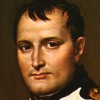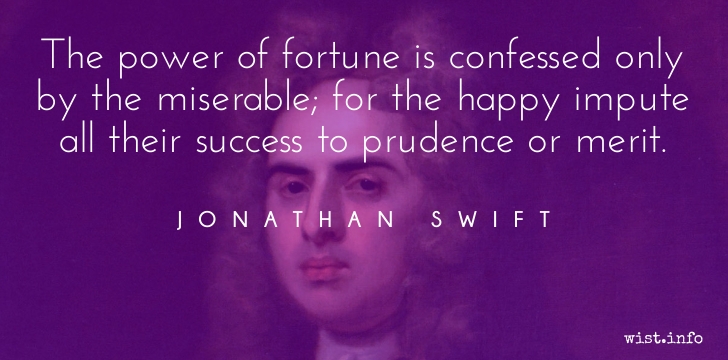In the fields of observation, chance favors only the prepared mind.
[Dans les champs de l’observation, le hasard ne favorise que les espirits préparés.]
Louis Pasteur (1822-1895) French chemist, pharmacist, microbiologist
Speech, as new Dean of Science, University of Lille, France (1854-12-07)
(Source)
Often misattributed to Ansel Adams. It was, though, Adams' favorite aphorism, which he usually paraphrased as to "Chance favors the prepared mind."
Quotations about:
chance
Note not all quotations have been tagged, so Search may find additional quotes on this topic.
Chance is necessity hidden behind a veil.
[Zufall ist die in Schleier gehüllte Nothwendigkeit.]
Marie von Ebner-Eschenbach (1830-1916) Austrian writer
Aphorisms [Aphorismen], No. 10 (1880) [tr. Scrase/Mieder (1994)]
(Source)
If all public questions were settled by shooting dice, fifty percent of them would be settled correctly. This would be five times as good a score as we make now.
H. L. Mencken (1880-1956) American writer and journalist [Henry Lewis Mencken]
A Little Book in C Major, ch. 3, § 19 (1916)
(Source)
Although our intellect always feels itself urged towards clearness and certainty, still our mind often feels itself attracted by uncertainty. Instead of threading its way with the understanding along the narrow path of philosophical investigations and logical conclusions, in order almost unconscious of itself, to arrive in spaces where it feels itself a stranger, and where it seems to part from all well known objects, it prefers to remain with the imagination in the realms of chance and luck.
[Obgleich sich unser Verstand immer zur Klarheit und Gewißheit hingedrängt fühlt, so fühlt sich doch unser Geist oft von der Ungewißheit angezogen. Statt sich mit dem Verstande auf dem engen Pfade philosophischer Untersuchung und logischer Schlußfolgen durchzuwinden, um, seiner selbst sich kaum bewußt, in Räumen anzukommen, wo er sich fremd fühlt, und wo ihn alle bekannten Gegenstände zu verlassen scheinen, weilt er lieber mit der Einbildungskraft im Reiche der Zufälle und des Glücks.]
Karl von Clausewitz (1780-1831) Prussian soldier, historian, military theorist
On War [Vom Kriege], Book 1, ch. 1 “What Is War? [Was ist der Krieg?],” § 22 (1.1.22) (1832) [tr. Graham (1873)]
(Source)
(Source (German)). Alternate translations:
Although our intellect always feels itself urged toward clarity and certainty, our mind still often feels itself attracted by uncertainty. Instead of threading its way with the intellect along the narrow path of philosophical investigation and logical deduction, in order almost unconsciously, to arrive in spaces where it finds itself a stranger and where all familiar objects seem to abandon it, it prefers to linger with imagination in the realms of chance and luck.
[tr. Jolles (1943)]
Although our intellect always longs for clarity and certainty, our nature often finds uncertainty fascinating. It prefers to day-dream in the realms of chance and luck rather than accompany the intellect on its narrow and tortuous path of philosophical enquiry and logical deduction only to arrive -- hardly knowing how -- in unfamiliar surroundings where all the usual landmarks seem to have disappeared.
[tr. Howard & Paret (1976)]
I don’t care how smart you are, if you say something you are liable to say something foolish, and the smarter you are, and the longer you talk, the more foolish things you will say.
The art of war deals with living and with moral forces. Consequently, it cannot attain the absolute, or certainty; it must always leave a margin for uncertainty, in the greatest things as well as in the smallest. With uncertainty in one scale, courage and self-confidence should be thrown into the other to correct the balance. The greater they are, the greater the margin that can be left for accidents.
[Die Kriegskunst hat es mit lebendigen und mit moralischen Kräften zu thun; daraus folgt, dass sie nirgends das Absolute und Gewisse erreichen kann; es bleibt also überall dem Ungefähr ein Spielraum, und zwar eben so gross bei dem Grössten, wie bei dem Keinsten. Wie dieses Ungefähr auf dereinen Seite steht, muss Muth und Selbstvertrauen auf die andere treten und die Lücke ausfüllen. So gross, wie diese sind, so gross darf der Spielraum für jenes werden.]
Karl von Clausewitz (1780-1831) Prussian soldier, historian, military theorist
On War [Vom Kriege], Book 1, ch. 1 “What Is War? [Was ist der Krieg?],” § 22 (1.1.22) (1832) [tr. Howard & Paret (1976)]
(Source)
(Source (German)). Alternate translations:
The art of war has to deal with living and with moral forces; the consequence of which is that it can never attain the absolute and positive. There is therefore everywhere a margin for the accidental; and just as much inthe greatest things as in the smallest. As there is room for this accidental on the one hand, so on the other there must be courage and self-reliance in proportion to the room left. If these qualities are forthcoming in a high degree, the margin left may likewise be great.
[tr. Graham (1873)]
The art of war has to do with living and with moral forces; from this it follows that it can nowhere attain the absolute and certain; there remains always a margin for the accidental just as much with the greatest things as with the smallest. As on the one side stands this accidental element, so on the other courage and self-confidence must step forward and fill up the gap. The greater the courage and self-confidence, the larger the margin that may be left for the accidental.
[tr. Jolles (1943)]
We were entrusted to one another, in the days which mattered, Clare thought. Entrusted to one another by chance, not choice. Chance, and its agents time and place. Chance is better than choice; it is more lordly. In its carelessness it is more lordly. Chance is God, choice is man. You — she thought, looking at the bed — chanced not chose to want us again.
Elizabeth Bowen (1899-1973) Irish author
The Little Girls, ch. 7 (1964)
(Source)
Quoted, in abbreviated form, in the foreword to her Pictures and Conversations (1975):
Chance is better than choice; it is more lordly. Chance is God, choice is man.
Chance is the pseudonym of God when he did not want to sign.
[Le hasard, c’est peut-être le pseudonyme de Dieu quand il ne veut pas signer.]
Théophile Gautier (1811-1872) French poet, writer, critic
La Croix de Berny, Letter 3 (1855) [with Jules Sandeau, Émile de Girardin, and Joseph Méry]
Source (French). Alternate translation:
Let [chance] act, for perhaps it is the pseudonym of God.
[tr. Fendall/Holcomb (1873)]
Frequently misattributed to Anatole France.
By applying conjecture to the countless delusions of drunk or crazy men we may sometimes deduce what appears to be a real prophecy; for who, if he shoots at a mark all day long, will not occasionally hit it? We sleep every night and there is scarcely ever a night when we do not dream; then do we wonder that our dreams come true sometimes? Nothing is so uncertain as a cast of dice and yet there is no one who plays often who does not sometimes make a Venus-throw and occasionally twice or thrice in succession. Then are we, like fools, to prefer to say that it happened by the direction of Venus rather than by chance? And if we are to put no trust in false visions at other times I do not see what especial virtue there is in sleep to entitle its false visions to be taken as true.
[Iam ex insanorum aut ebriorum visis innumerabilia coniectura trahi possunt, quae futura videantur. Quis est enim, qui totum diem iaculans non aliquando conliniet? Totas noctes dormimus, neque ulla est fere, qua non somniemus, et miramur aliquando id quod somniarimus evadere? Quid est tam incertum quam talorum iactus? Tamen nemo est quin saepe iactans Venerium iaciat aliquando, non numquam etiam iterum ac tertium. Num igitur, ut inepti, Veneris id impulsu fieri malumus quam casu dicere? Quodsi ceteris temporibus falsis visis credendum non est, non video, quid praecipui somnus habeat, in quo valeant falsa pro veris.]
Marcus Tullius Cicero (106-43 BC) Roman orator, statesman, philosopher
De Divinatione [On Divination], Book 2, ch. 59 (2.59) / sec. 121 (44 BC) [tr. Falconer (1923)]
(Source)
The "Venus throw" or "Point of Venus" was the highest-scoring throw in the Roman game of Tali, throwing four knucklebone dice to show one each of the four main sides (1, 3, 4, 6). (Source (Latin)). Alternate translation:
From the visions of drunkards and madmen one might, doubtless, deduce innumerable consequences by conjecture, which might seem to be presages of future events. For what person who aims at a mark all day long will not sometimes hit it? We sleep every night; and there are very few on which we do not dream; can we wonder then that what we dream sometimes comes to pass? What is so uncertain as the cast of dice? and yet no one plays dice often without at times casting the point of Venus, and sometimes even twice or thrice in succession. Shall we, then, be so absurd as to attribute such an event to the impulse of Venus, rather than to the doctrine of chance? If then, on ordinary occasions, we are not bound to give credit to false appearances, I do not see why sleep should enjoy this special privilege, that its false seemings should be honoured as true realities.
[tr. Yonge (1853)]
What is more uncertain than the fall of the dice? Yet everyone will occasionally throw the double six, if he throws often enough; nay, sometimes even twice or thrice running.
[Source]
In a world that operates largely at random, coincidences are to be expected, but any one of them must always be mistrusted.
Men have made an idol of luck as an excuse for their own thoughtlessness. Luck seldom measures swords with wisdom. Most things in life quick wit and sharp vision can set right.
Democritus (c. 460 BC - c. 370 BC) Greek philosopher
Frag. 119 (Diels) [tr. Bakewell (1907)]
(Source)
Bakewell lists this under "The Golden Sayings of Democritus." Freeman notes this as one of the Gnômae, from a collection called "Maxims of Democratês," but because Stobaeus quotes many of these as "Maxims of Democritus," they are generally attributed to the latter. Alternate translations:
- "Men have fashioned an image of Chance as an excuse for their own stupidity. For Chance rarely conflicts with intelligence, and most things in life can be set in order by an intelligent sharpsightedness." [tr. Freeman (1948)]
- "Men fashioned the image of chance as an excuse for their own thoughtlessness; for chance rarely fights with wisdom, and a man of intelligence will, by foresight, set straight most things in his life." [tr. Barnes (1987)]
You can have the other words — chance, luck, coincidence, serendipity. I’ll take grace. I don’t know what it is exactly, but I’ll take it.
Convinced that character is all and circumstances nothing, [the Puritan] sees in the poverty of those who fall by the way, not a misfortune to be pitied and relieved, but a moral failing to be condemned, and in riches, not an object of suspicion but the blessing which rewards the triumph of energy and will.
R. H. Tawney (1880-1962) English writer, economist, historian, social critic [Richard Henry Tawney]
Religion and the Rise of Capitalism, ch. 4 (1926)
(Source)
No victor believes in chance.
[Kein Sieger glaubt an den Zufall.]
Friedrich Nietzsche (1844-1900) German philosopher and poet
The Gay Science [Die fröhliche Wissenschaft], Book 3, § 258 (1882) [tr. Kaufmann (1974)]
(Source)
Also known as La Gaya Scienza, The Joyful Wisdom, or The Joyous Science.
(Source (German)). Alternate translations:
No conqueror believes in chance.
[tr. Common (1911)]
No victor believes in chance.
[tr. Nauckhoff (2001)]
A consecutive series of great actions never is the result of chance and luck; it is always the product of planning and genius. … Is it because they are lucky that they have become great? No, but by being great, they have been able to master luck.
The power of fortune is confessed only by the miserable; for the happy impute all their success to prudence or merit.
Jonathan Swift (1667-1745) English writer and churchman
“Thoughts on Various Subjects” (1706)
(Source)
Man — who is he?
Too bad to be the work of God; too good for the work of chance![Der Mensch, wo ist er her?
Zu schlecht für einen Gott, zu gut fürs Ungefähr.]Gotthold Lessing (1729-1781) German playwright, philosopher, dramaturg, writer
Fragmente und Fabeln [Fragments and Fables], Fragment 6 “Die Religion” (1753)
As with many of his quotations, frequently misattributed to contemporary author Doris Lessing.
(Source (German)). Alternate translation:
Man, whence is he?
Too bad to be the work of a god, too good for the work of chance.
[ed. Wood (1893)]
All people should be loved equally. But you cannot do good to all people equally, so you should take particular thought for those who by the chance of place or time or anything else are, as if by lot, in particularly close contact with you.
[Omnes autem aeque diligendi sunt. Sed cum omnibus prodesse non possis, his potissimum consulendum est, qui pro locorum et temporum vel quarumlibet rerum opportunitatibus constrictius tibi quasi quadam sorte iunguntur.]
Augustine of Hippo (354-430) Christian church father, philosopher, saint [b. Aurelius Augustinus]
On Christian Doctrine [De Doctrina Christiana], Book 1, ch. 28 / § 29 (1.28.29) (AD 397) [tr. Green (1995), § 61]
(Source)
(Source (Latin)). Alternate translations:
Further, all men are to be loved equally. But since you cannot do good to all, you are to pay special regard to those who, by the accidents of time, or place, or circumstance, are brought into closer connection with you.
[tr. Shaw (1858)]
All other men are to be loved equally; but since you cannot be of assistance to everyone, those especially are to be cared for who are most closely bound to you by place, time, or opportunity, as if by chance.
[tr. Robertson (1958)]
We do not what we ought,
What we ought not, we do,
And lean upon the thought
That chance will bring us through;
But our own acts, for good or ill, are mightier powers.Matthew Arnold (1822-1888) English poet and critic
Empedocles on Etna, Act 1, sc. 2, ll. 238-242 (1852)
(Source)
Only when man’s life comes to its end in prosperity can one call that man happy.
Aeschylus (525-456 BC) Greek dramatist (Æschylus)
Agamemnon, l. 928
Alt trans.:Compare to Sophocles.
- "Call no man happy till he is dead."
- "Hold him alone truly fortunate who has ended his life in happy well-being."
Nought venter nought have.
John Heywood (1497?-1580?) English playwright and epigrammist
Proverbes, Part 1, ch. 11 (1564)
(Source)
More commonly rendered, "Nothing ventured, nothing gained."
When playing Russian roulette the fact that the first shot got off safely is little comfort for the next.
Richard Feynman (1918-1988) American physicist
Rogers Commission Report into the Challenger Crash, Appendix F “Personal Observations on Reliability of Shuttle” (Jun 1986)
Full report
FLORIZELL: But as th’ unthought-on accident is guilty
To what we wildly do, so we profess
Ourselves to be the slaves of chance, and flies
Of every wind that blows.William Shakespeare (1564-1616) English dramatist and poet
Winter’s Tale, Act 4, sc. 4, l. 543ff (4.4.543-546) (1611)
(Source)
And, to conclude, he that leaveth nothing to Chance will do few things ill, but he will do very few things.
George Savile, Marquis of Halifax (1633-1695) English politician and essayist
“Of Caution and Suspicion,” Political, Moral, and Miscellaneous Thoughts and Reflections (1750)
(Source)
Sometimes incorrectly attributed to Edward Wood, Earl of Halifax (1881-1959).
A wise man turns Chance into good Fortune.
Thomas Fuller (1654-1734) English physician, preacher, aphorist, writer
Gnomologia: Adages and Proverbs, # 475 (1732)
(Source)
It may be that the race is not always to the swift, nor the battle to the strong — but that’s the way to bet.
Hugh E. Keough (1864-1912) Canadian-American sports journalist
(Attributed)
Variants:Also attributed to Damon Runyon, Franklin Pierce Adams, Grantland Rice, and Burns Mantle, all of of whom in turn credited Keough. The saying itself, a take-off on Ecclesiastes 9:11, has a number of antecedents: see here for more background.
- "The race is not to the swift, nor the battle to the strong; but the betting is best that way."
- "To be sure the race is not always to the swift, nor the battle to the strong; but it is ninety-nine times in a hundred."




























